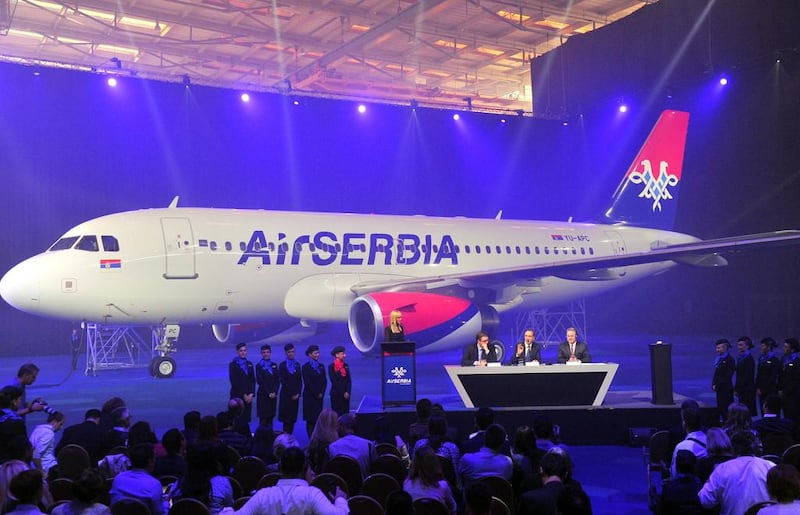Just over two-and-a-half years ago, I stood in an aircraft hangar at Belgrade’s airport with Aleksandar Vucic, now Serbia’s prime minister, and we unveiled the new Air Serbia – a new name, a new logo and a new livery.
The two governments, of Serbia and of Abu Dhabi, had come together to invest in this new national airline and we had moved quickly to launch this exciting new brand.
We made a promise that day: we would aim to create an airline of which every Serb could be proud.
It was an ambitious commitment. Air Serbia’s predecessor airline was a failing business, with old aircraft, outdated infrastructure – and no future.
But we believed that with new investment, and by being one of the Etihad Airways partners, there was a new path for Air Serbia.
Today, we celebrate the next milestone in an incredible story of renewal and development.
By the time most of you are reading this, I will be on a flight from that same airport, in Air Serbia’s first-ever wide-body aircraft. The Airbus A330 will be taking more than 250 people on the airline’s first transatlantic flight, to New York City, re-establishing a direct air link between the Balkans and the Big Apple after a gap of 24 years.
The Air Serbia touching down at John F Kennedy Airport is a vibrant, growing airline, one which represents the very best of modern Serbia.
It has a young fleet, a dynamic workforce and a route network, which connects Belgrade with Europe, the Mediterranean and the Middle East – and now, North America.
Importantly, it is doing all that while delivering a return. Last year, it reported a net profit of €3.9 million (Dh16.1m), up 44 per cent on the previous year, and marking a second year of profitability.
Even more importantly, Air Serbia is delivering a major impact on the national economy. According to a new study by the respected research firm Oxford Economics, Air Serbia’s core contribution to Serbian GDP will be US$206m in 2016, with another $811m being delivered in tourism. By 2024, those contributions will reach more than $1,765 million, supporting more than 143,000 jobs in total.
In today’s global economy, a powerful national airline is a vital catalyst for trade and for tourism. The Serbian Government recognised that three years ago, when they first opened discussions with Abu Dhabi about a potential investment by Etihad Airways, as part of the broader economic cooperation between the two countries.
They also recognised that in today’s complex air travel sector, it is incredibly difficult to go it alone. Partnership is the key for effective development.
That is a lesson we at Etihad Airways had learnt some years previously. As a new national airline ourselves, launched in 2003, we have long embedded partnership into our business philosophy – everything from long-term strategic supplier relationships, to code-shares, to our equity investments. That was the only way we could compete on a global scale.
Our relationship with Air Serbia has been rewarding for both sides. Together, we have been able to create a well-capitalised business, running successfully today and with a very healthy long term outlook.
The New York service is a perfect example of our cooperation. The Airbus A330 has been leased from Jet Airways; the pilots were trained by Alitalia; and the cabin crew were trained in Abu Dhabi. Together, the Etihad Airways family rallied around to help make this happen.
As the most exciting airline in the Balkans today, Air Serbia can help consolidate Belgrade’s position as a regional hub. That too will have knock-on benefits in terms of trade and tourism.
The journey has not always been easy. There have been some tough decisions along the way. But those tough decisions were only ever about creating a commercially sustainable business of which all Serbians could be proud.
For an airline to achieve so much in less than three years is testament to the hard work of its management and employees, under the leadership of Dane Kondic. I congratulate every one of the 2,465 members of the Air Serbia team for their individual contributions. They should all be proud of their successes to date.
As I toured the new Airbus A330 this week at a bustling Nikola Tesla Airport, I too shared that pride.
This is a business that has achieved much in its first 33 months, and that has delivered much to the Serbian economy.
But this is only the start. If Air Serbia can keep the pace it has followed in its first 33 months for the next 33 years, this is a business that will make all Serbians proud.
We in Abu Dhabi can also feel proud of being part of this story.
James Hogan is the president and chief executive of Etihad Aviation Group and the vice chairman of Air Serbia





